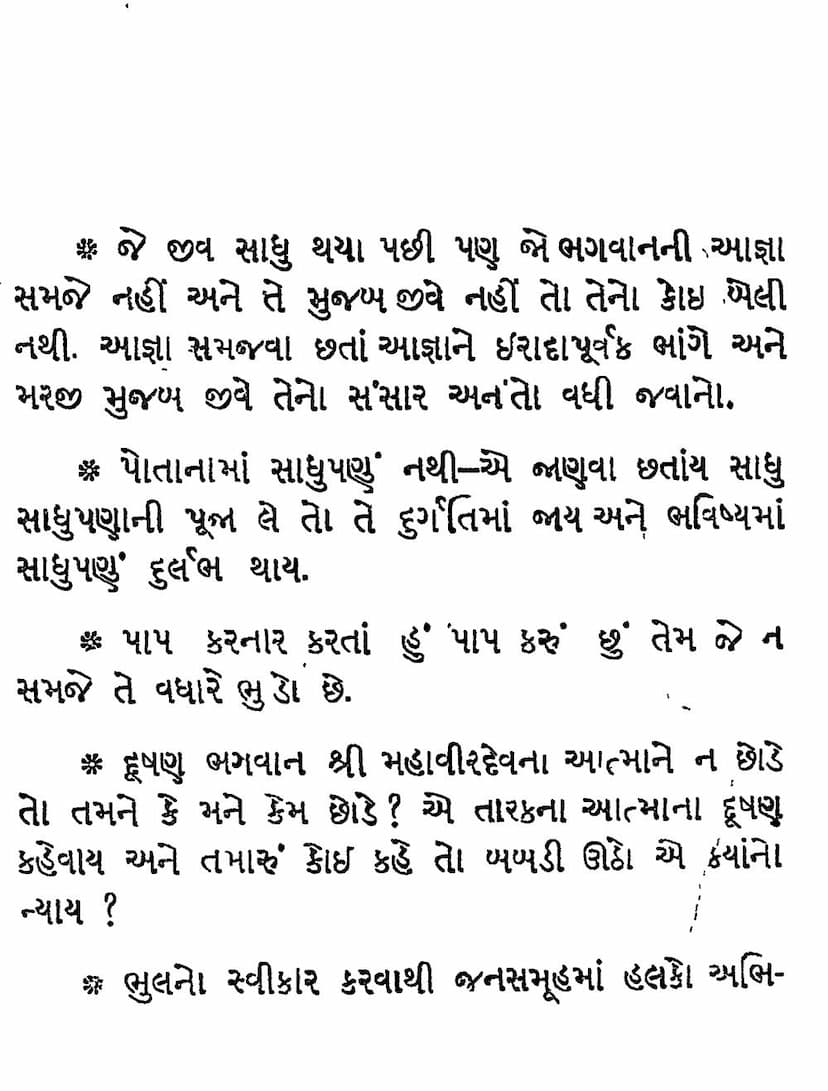Sanyam Raksha Ange Mari Manovyatha
Added to library: September 2, 2025

Summary
Summary of "Sanyam Raksha Ange Mari Manovyatha"
This Jain text, "Sanyam Raksha Ange Mari Manovyatha" (My Anguish Regarding the Protection of Restraint), authored by Deepchand Vakhatchand Mehta, is a profound and deeply personal expression of the author's anguish and concern over the perceived decline in adherence to Jain principles, particularly within the monastic community. The book compiles numerous letters and statements addressed to prominent Jain Acharyas and the wider Jain community, spanning several years, from 1980 to 1985.
The central theme revolves around the author's deep distress over the laxity and perceived deviation from the strict tenets of Jainism, especially concerning the conduct and adherence to vows by monks and nuns. The author expresses immense disappointment and pain when observing what he believes to be a departure from the teachings of Lord Mahavir and the established scriptures.
Key Concerns and Arguments Raised by the Author:
- Dilution of Monastic Discipline: The author repeatedly expresses concern about the erosion of strict adherence to the five great vows (mahavrats) by monks and nuns. He laments instances where he perceives a compromise on principles for the sake of worldly comforts, status, or personal relationships.
- Compromise on Scriptural Truths: The author is particularly pained by what he sees as a willingness to bend or ignore scriptural injunctions, especially when it comes to the strict adherence to the calendar of religious observances (tithis) and other established practices. He feels that while the outward appearance of religious adherence might be maintained, the inner spirit and strictness are compromised.
- Influence of Wealth and Status: A significant concern is the perceived influence of wealthy patrons and the potential for worldly considerations to overshadow spiritual pursuits and strict adherence to principles. The author is troubled by instances where such influence seems to dictate or compromise religious practices and standards.
- The Role of Acharyas and Spiritual Leaders: The author directs his concerns towards the highest spiritual leaders, Acharyas, questioning their commitment to upholding the strictness of the faith, especially when they seem to be overlooking or not actively rectifying deviations. He believes the responsibility for maintaining the purity of the monastic order lies with them.
- The "Two Calendar" Issue: The author refers to a dispute related to the observance of religious dates (tithis), highlighting his belief that one specific interpretation, adhering strictly to scriptural timelines, is the correct one. He is distressed when this adherence appears to be compromised.
- The Importance of True Renunciation: The author emphasizes that true renunciation involves not just outward appearance but an internal detachment from worldly desires and strict adherence to the path of self-discipline, austerity, and non-violence.
- Personal Anguish and Efforts for Reform: The author's tone is one of deep personal anguish. He details his repeated attempts to communicate his concerns through letters and discussions over several years, expressing his frustration at the lack of substantive response or change. He feels compelled to make his concerns public when his private appeals go unanswered.
- Call for Vigilance and Adherence to Principles: Throughout the text, there's an underlying plea for introspection and a return to the core principles of Jainism. The author urges the community, especially its spiritual leaders, to prioritize the purity of the monastic order and the faithful observance of all vows and scriptures, as this is the true path to spiritual upliftment and the preservation of the Jain faith.
- Specific Allegations and Examples: While the text is largely a lament and a plea, it touches upon specific concerns like the management of temple trusts, the adherence to rules regarding interactions between monks and nuns, and the conduct of certain practices that the author finds contrary to Jain principles.
Overall Tone and Purpose:
The author's intent is not to criticize for the sake of criticism, but rather to express a genuine and deeply felt pain over what he perceives as a weakening of the Jain path. He believes that the purity of the monastic order and the strict adherence to principles are paramount for the spiritual well-being of the community and the continuation of the Jain tradition. The book serves as a testament to his unwavering commitment to the core values of Jainism and his desperate plea for a return to righteousness and adherence to the path laid out by the Tirthankaras.
The text reflects a deep reverence for Jain teachings and a profound sadness when these are perceived to be neglected, leading to a yearning for the restoration of stricter discipline and spiritual fervor.